Larry Darter's Blog, page 3
March 25, 2019
How Write On with Vanda Symon Can Inspire You
[image error]
Write On with Vanda Symon is a long running popular literary radio programme and podcast from the Otago Southland branch of the New Zealand Society of Authors.
After listening to the March 2019 Write On episode this morning, I wrote this post to share with you a few of the great reasons you should tune in each month.
Write On episodes are first broadcast on Otago Access Radio 105.4 FM the second Wednesday of each month, but fortunately you can listen to the current episode or past episodes anytime from any place by visiting the Otago Access Radio 105.4 FM website.
Write On showcases the work and lives of Otago and Southland writers, but that doesn’t mean you must be a Kiwi to benefit from the valuable tips, insights, and information available to those who listen to Vanda Symon’s delightful interviews each month. Whether you’re an author or reader, you will find much to inspire you by listening to the programme. Personally, I consider it one of the finest literary shows available.
I’ve always been enthusiastic about reading the work of authors from other countries. Not only has this helped me discover delightfully fresh and entertaining stories, it has also given me enjoyable insight into and appreciation for the cultures of writers from other countries. As a result, I have discovered many favorite authors from the UK, New Zealand, and Australia.
Reading books written by authors outside the United States broadens my appreciation for literature and exposes me to new writers in my favorite genre, crime fiction. Write On has introduced me to several great New Zealand authors. But I find listening to Write On just as inspiring as an author as I do as a reader.
My second crime fiction series, the T.J. O’Sullivan series, features a female New Zealand expat who lives in Honolulu, Hawaii and works there as a private investigator. My best mate Jess, an amazing Kiwi woman who lives in Queenstown inspired my decision to write the series. While not an expat, Jess has spent a great deal of time traveling and living in the U.S. and other places because of her work. From that I got the idea for the character T. J. O’Sullivan. You will find a lot of my interpretation of Jess’s lovely personality in the T. J. character. Sorry Jess, and you’re welcome.
While I have Jess to rely on in hopefully capturing in the T.J. O’Sullivan books the unique way Kiwi’s speak English, listening to Write On also provides me heaps of inspiration in this regard. It gives me the opportunity to listen to many other Kiwis speaking and hearing how they use many of the delightful slang terms, acronyms, and phrases unique to New Zealand. So, it’s a win-win, aye? I get to hear awesome and entertaining interviews with Kiwi authors, learn about great new books, and get inspiration I can use in writing one of my own book series.
If you’re unaccustomed to the way New Zealand people speak English, you will find it quite different from not only the “British Style” and “American Way,” but also a good bit different from how Australians speak the language. You can see a hilarious take on this by watching Air New Zealand’s “Santa Claus Can’t Understand Kiwis” 2018 Christmas ad. Part of difference comes from incorporating the Maori language into Kiwi English.
The Maori are the indigenous Polynesian people of New Zealand, settlers from eastern Polynesia who arrived in New Zealand in several waves of canoe voyages between 1250 and 1300. Over several centuries in isolation, the Polynesian settlers developed a unique culture, with their own language, a rich mythology, and distinctive crafts and performing arts.
Maori words and phrases in the general language of New Zealand is not only representative of the increased recognition of Maori culture, but an expression of a unique national identity. By recent accounts there are about one thousand Maori words used regularly by non-native speakers.
Words like waka (technically canoe, but often used to describe any motor vehicle), kia ora (hello), kai (food), and whanau (family) can now be heard interspersed in everyday Kiwi conversation. The development of Kiwi English in this direction is tumeke! (awesome)! But, this uptake of indigenous words and phrases, although significant, isn’t the only thing that makes Kiwi English different from the way English is spoken in the other fifty-eight countries where it is the official language.
The most obvious difference between the ways Kiwis and the British speak as an example is the accent. Kiwis flatten vowels into what can sometimes seem almost unrecognizable monotones which has to do with phonemes, those perceptually distinct units of sound in a specified language that distinguish one word from another. But that’s not all.
Kiwi English is often relentlessly tongue-in-cheek. When they say one thing, they may often mean the exact opposite. For example, if a Kiwi calls you a “winner” don’t celebrate right away as it could mean you’ve likely just made a fool of yourself and lost by a large margin. While “quite nice” is generally used in the English-speaking world to refer to something that is, in New Zealand the phrase often means the complete opposite. Kiwis also cleverly tack the word “as” on ubiquitously to exaggerate any preceding adjective, like hungry as (very hungry), sweet as (extraordinarily good), and beached as (well and truly stuck or in difficult circumstances). And how about the rhetorical “aye” often tacked on to the end of a spoken sentence?
At any rate, I fell in love with the way Kiwis speak English when I was first introduced to it. Maybe I’m just enamored with the uniqueness. Over time, mostly from the influence of my friend Jess and other Kiwi friends, I’ve unconsciously incorporated a lot of Kiwi speech into my own.
You’ve heard all the great reasons I never miss an episode of Write On with Vanda Symon. You should really give it a listen and I’m confident you will find your own.
I’d be remiss if I ended this post without also telling you that Vanda Symon is not only a super radio programme producer and host but also a fabulous crime fiction writer. I’ve read and absolutely loved all her books. While she is best known for her awesome Sam Shephard series, Vanda has a darker standalone crime novel called The Faceless which is also terrific. Overkill is the first book in the Sam Shephard series and I’m certain it will hook any crime fiction fan who reads it for the series. All four of the current books in the Sam Shephard series are being re-edited, updated, and being made available as eBooks. Overkill and The Ringmaster, the second book in the series, are available now from most retailers including Amazon with the others to follow.
Between her books and outstanding radio programme, Vanda Symon has been such a personal inspiration I dedicated The Chinese Tiger Ying, the third book in the T. J. O’Sullivan series to her as a token of my respect and esteem for her work. That’s how truly inspirational I find this great Kiwi author to be.
Follow Vanda Symon on Twitter @vandasymon
The post How Write On with Vanda Symon Can Inspire You appeared first on Crime Fiction Author Larry Darter.
March 19, 2019
An Inside Look at Serialized Novels
Writing a serialized novel is something I’ve been thinking about for a while now. Do you know what a serialized novel is? Is it something you think you might enjoy reading or if you’re an author writing and publishing?
“A serial novel is a work of fiction that is published in sequential pieces called installments. These installments can be published at nearly any interval for nearly any period of time, though weekly and monthly installments are most typical.”
Source: Schlottman, Andrea. “The Serial Novel: A Brief History with 30 Examples [Infographic].” Books on the Wall, 17 May 2018, booksonthewall.com/blog/serial-novel-....
Serialized Novels Were Once the Rage
Serialized novels have traditionally been published by
literary magazines, newspapers, and other periodicals. They were once wildly
popular. Starting in nineteenth century Britain, serialized novels, delivered in
weekly or monthly periodicals were the rage. Charles Dickens’ The Pickwick
Papers is considered by many to be the first widely read serialized novel. Readers
would literally wait on the ship docks to receive the latest installments.
It might surprise you to know some of the notable novels that were originally published as serialized novels. Here are a few—
Uncle Tom’s Cabin by Harriet Beecher Stowe A Tale of Two Cities by Charles Dickens 20,000 Leagues Under the Sea by Jules Verne Treasure Island by Robert Louis Stevenson The Hound of the Baskervilles by Sir Authur Conan Doyle In Cold Blood by Truman Capote
Tom Wolfe’s The Bonfire of the Vanities ran as a serial in Rolling Stone Magazine in 1984, but the serialized novel was all but dead by the turn of the twentieth century.
Can Serialized Novels Make a Comeback?
There’s a psychological barrier we must get past to read lengthy novels these days. Haven’t you purchased a thick novel only for it to just sit on your bedside table unread? Theoretically, you could finish it by only reading for ten minutes a day at bedtime, but for some reason you never pick it up. It feels intimidating.
Part of it I think is the effects of television. Watching a sixty-minute television mystery for example instead of reading a mystery novel just feels more easily digestible. Our attention spans have become shorter. Television makes us feel like we aren’t making a huge commitment in time the way we must do to read a hundred thousand word novel. Yet we still receive the entertainment value.
Authors like James Patterson have given a lot of thought to writing shorter novels tailored to the reduced commitment many people will give to books these days. Patterson publishes a collection of novels called BookShots in an attempt to capitalize on the desire among readers for shorter novels. BookShots titles are typically 150 pages or fewer and cost on $5.99.
That’s one way to overcome the hurdle of low time investment in books many contemporary readers will give, but what about a comeback for serialized novels? The explosion of digital media in recent times seems tailor made for serialized novels. Instead of 100,000 words or even 150 pages, an author would need only capture a reader’s attention for mere minutes at a time by publishing novels in installments on weekly or monthly intervals.
Publishing serialized novels on a platform like KDP Select would make serialized fiction available virtually free to those who subscribe to Kindle Unlimited. And offered at low price points, there might even be a robust market for serialized fiction among those who don’t subscribe to Kindle Unlimited.
Can I Simply Chop a Traditionally Written Novel into Bite-Size Pieces?
Having done a good bit of research into serialized fiction, I have already learned that taking a traditionally written novel and chopping it into installments has never been successful. I imagine it might be difficult for readers to hang onto the plot or unifying theme by reading a novel this way. Serialized novels are a different animal altogether. We can’t structure a serialized novel like a traditional novel because it’s episodic.
I tend to think of serialized fiction as something like a television soap opera only in print. Remember those? I know they still exist, but they aren’t as popular as they once were. Well, in countries like New Zealand, there are still modern versions of soap operas that people are keen to watch, but they aren’t very popular here anymore.
To my chagrin, my mother used to watch soap operas all afternoon during the summer breaks from school when I was growing up. That was in the days before DVRs, before VCRs even, so a committed soap opera fan like mom had to literally plan her day around catching the new episodes each weekday. To me they were long, boring, never-ending stories that never seemed to culminate in any real resolution. But successful serialized fiction it seems needs to be written in a similar way.
What Successful Serialized Novels Require
Angela Booth, who had written extensively on serialized fiction says the medium “demands narrative drive” which she defines as that which “makes your story involving, and keeps it moving.” I can see how this would be critically necessary on both the micro and macro scales.
Angela also says episodic fiction requires strong characters who stay positive. No reader wants cardboard characters who don’t seem real whether it’s serialized novels or traditional novels. The characters must be active and have goals. Where positivity comes in, according to Angela, is readers won’t likely buy the next episode if the previous one was a downer. It seems the writing must remain upbeat for readers to find in entertaining and worth their money.
Finally, Angela tells us authors must make certain to end each episode with a cliffhanger, a point of intrigue that will leave readers wanting more.
Another article I read about serialized fiction added one additional requirement. Each installment must be a complete story, in some respects like a short story. Readers don’t want an unending stream of installments where real resolution is nowhere in sight. They aren’t for example going to wait until the very end of the novel to get that. I think that is exactly why I hated those soap operas. That’s how I saw them.
This summer I plan to write a serialized novel. I haven’t decided whether to write one using one of my current series or to create a brand new series just for the purpose. Even if it turns out commercially unsuccessful, I think it might be good fun. And, if it isn’t well-received I could always edit it to make into a traditional novel and re-publish it that way.
What do you think about serialized novels? Would you be willing to read them? Would you write them? Can serialized fiction make a modern-day comeback? Much like those readers in Dicken’s day waiting on the ship docks in eager anticipation of his next installment, it looks like we’ll just have to wait and see.
The post An Inside Look at Serialized Novels appeared first on Crime Fiction Author Larry Darter.
March 15, 2019
My Typical Writing Day
There is really is no such thing as a “typical” day when I’m busy writing a book, actually. Some days the words flow. Other days it feels like wading through mud. Some days the phone won’t stop ringing. Unexpected visitors appear at the front door. There is an urgent email demanding a reply. A few days ago I spent a whole day working on my tax return. Like everyone else some days are consumed by mundane chores like shopping, paying bills, or running errands. On days like that little writing gets done.
Writing is a craft but I also try to treat it as a business. Ideally, I try to get in two writing sessions a day. During the evening session, I write by hand in a notebook. I don’t seek perfection here, just let the words flow onto the page. Then the following day during my morning session I type what I’d written the previous evening and polish it a little. I continue with the same process until I complete the first draft.
Since I have the luxury to spend my days writing now, I can usually finish a first draft quite quickly. On average, I write the equivalent of a chapter, sometimes two each day, five days a week. That works out to about six weeks to complete a first draft.
I’m in the middle of the next Malone book right now. It’s going pretty well. The first draft is about thirty percent finished. I expect to complete it by mid-April. It’s rough. During the second draft I’ll be checking to see that the plot works. The second draft also sees me polishing the prose, fixing plot holes or faults in chronology. I also use the second draft as an opportunity to add flesh to the bones of my characters.
The third draft is what my editor sees. Here I focus on the pace, check for errors in chronology and geography again. I look to make certain I have the desired consistency with things like how I’ve used numbers and punctuation throughout the manuscript.
Independent authors wear many hats. Besides the writing we also have complete responsibility for marketing, advertising, formatting, creating or having covers made, and deciding on distribution. Then there is time that must be spent on maintaining a social media presence. I found keeping up with it all a bit overwhelming until I came up with the two writing sessions per day system I mentioned above. It allows me plenty of time for writing, but frees up my afternoons to keep up with the business aspects of being an author entrepreneur.
There you have my “typical” day as a crime fiction writer, at least as typical as my days ever get.
[image error]
[image error]
Most Recent Release
Foul Play, the sixth novel in the Malone series was just released this month. It's now available in print and electronic editions. Malone goes south of the border in search of a Boston socialite's estranged husband and finds more than he bargained for.
Learn More
[image error]
Coming Next Month
The Chinese Tiger Ying, the third book in the T.J. O'Sullivan series is now available for pre-order from Amazon. T.J. is hired by an antiques and historical artifacts dealer to recover a stolen 3,000 year old Chinese relic, a bronze water pot called Tiger Ying.
Learn More
[image error]
What's Coming Next
Black Deeds, the seventh Malone novel is slated for release this fall. For the first time since Come What, this story is inspired by a true story ripped right from recent headlines involving a sex cult posing as a professional development training company.
Learn More
SAVE $2...
Get $2 off the cover price when you pre-order The Chinese Tiger Ying before April 1, 2019.
GET IT FROM AMAZON
The post My Typical Writing Day appeared first on Crime Fiction Author Larry Darter.
January 28, 2019
Honolulu Blues Nominated for 2019 Readers Choice Award
2019 Readers Choice Nomination
I'm honored and thrilled Honolulu Blues, the second novel in the T.J. O'Sullivan series has been nominated for the 2019 Readers Choice Awards contest by TCK Publishing in the Favorite Thrillers category.
Please Vote
The winner will be selected by reader votes. If you would like to vote for Honolulu Blues or any of the other great thrillers, visit the Readers Choice voting page and cast your vote Complete instructions are available on the page. The FAVORITE THRILLER BOOK category is found on page 9/16 if you don't wish to page through all the categories.
If You Haven't Read Honolulu Blues
For those who haven't read Honolulu Blues, it's available exclusively on Amazon. If you're a Kindle Unlimited subscriber, read it free on Amazon.
Vote Today...
Click the button to the right to go directly to TCK Publishing to cast your vote for the Readers Choice Awards.
Readers Choice Vote
The post Honolulu Blues Nominated for 2019 Readers Choice Award appeared first on Crime Fiction Author Larry Darter.
December 21, 2018
Foul Play Novel Sample Chapter
[image error]
Foul Play, the sixth novel in the Malone series is slated for release in March 2019. Enjoy the sample first chapter now.
Synopsis: Private eye Ben Malone's search for a sweet young thing's estranged husband leads him south of the border into deception, fraud, and murder.
"It was one of those clear, sunny afternoons we get in Los Angeles in the early spring after a rain. There was still snow on the peaks of the San Gabriel Mountains, but the Hollywood Hills
were green, and the jacaranda trees were blooming in Beverly Hills."
So begins Foul Play, the sixth novel featuring Los Angeles private eye Ben Malone. Business is a little slow, and Malone is feeling restless until L.A. attorney Liz Harper calls with a job: a young, beautiful, and desperate woman wants Malone to find her estranged husband, a man named Keaton Douglas.
Malone sets out on his search, almost immediately discovering Douglas' whereabouts. But that is merely the first in a series of bewildering events. Soon he is tangling with a trio of ruthless people and quickly learning just how far they are willing to go to protect their confidence scheme.
FOUL PLAY - SAMPLE
A Malone Private Investigator Novel (Book 6)
Copyright © 2018 by Larry Darter
Chapter 1
It was one of those clear, sunny afternoons we get in Los Angeles in the early spring after a rain. There was still snow on the peaks of the San Gabriel Mountains, but the Hollywood Hills were green, and the jacaranda trees were blooming in Beverly Hills. I was sitting in my office with my jacket off and my feet up on the corner of the desk, reading a book called T. S. Eliot’s Collected Poems 1909-1962. Bridgette Carpenter, my unofficial foster daughter you might say, had given me for my birthday.
I was reading the poem “Portrait of a Lady” when the phone rang. My secretary Rhonda answered the phone most of the time, but she was off on another cruise in the Caribbean somewhere. I reached for the phone, lifted the receiver, and said in my best Bogart imitation voice, “Sam Spade, here.”
At the other end a voice I knew sighed and then said, “Ben Malone, please.”
I said in my Bogart’s voice, “Hold the line a moment, sweetheart.” Then in my normal voice, “Hello.”
The voice on the phone said, “Malone, did you really expect to fool anyone with that nonsense?”
I said, “You want to hear me do Bill Clinton?”
“No, I do not. I don’t have the time, Malone. This is Liz Harper. I assume you recall me.”
“All the time,” I said. Liz Harper was an attractive attorney with very nice legs I worked for from time to time.
Liz laughed a little and said, “I have work for you.”
“Who do you need killed?” I said.
“It’s nothing that exciting I’m afraid,” Liz said. “I want you to find a man for me.”
“You’ve needed no help in that department before.”
“Hilarious,” Liz said. “You’re a laugh a minute, Malone. Care to be serious for thirty seconds so I might offer you gainful employment?”
“If you insist,” I said. “What is it you want done?”
“The man I want found,” Liz went on, “is Keaton Douglas, formerly of Boston. He is thirty-five years old, five feet ten inches tall, well built, and fair-skinned, with light brown hair and brown eyes. Four years ago, he was a typical clean-cut Bostonian man. He may not look it now because the last four years have been hard ones for him, I’ve been told.”
“What has he done?” I asked.
“Keaton Douglas isn’t a criminal, as far as I know,” Liz said. “I want you to find him for Mrs. Cara Douglas, his wife. Four years ago, the Douglases were living together in Boston. Cara Douglas it seems was of a very jealous disposition, and he was rather temperamental. Cara Douglas also had a great deal of money she inherited from her parents while her husband had only the income from his employment. Keaton had always been sensitive about being married to a wealthy woman and inclined to go out of his way to show he wasn’t dependent on his wife for his living. One evening, she accused him of paying too much attention to another woman at a party they had attended. They quarreled, and Keaton Douglas packed up and left the marital home.”
“Did they divorce?” I said.
“No,” Liz said. “Within a week of the incident, Cara Douglas learned that her suspicions had been unwarranted and only the product of her own jealousy. She was repentant over having accused her husband of infidelity. She tried to find him, but he had disappeared. When it became clear that Douglas had left Boston, she hired a Boston private investigations firm to mount a nationwide search. They traced him from Boston to Seattle, and then to San Francisco. An operative of the investigations agency found Douglas living in a sleazy hotel on the western side of the Haight-Ashbury District across the street from Golden Gate Park. The operative informed Douglas that his wife had been searching for him and gave Douglas a copy of a handwritten letter from her asking him to call or email her to discuss a possible reconciliation.”
“Did she get any response?”
“Not right away. After the contact from the investigations agency operative, Douglas dropped out of sight again until he appeared in Los Angeles six months later. On February 11, 2018, he shot and killed a burglar in his hotel room on South Grand Avenue. The Los Angeles police found the shooting suspicious, but it appeared the man he killed was a burglar. They had nothing to hold Douglas on. After the police released him, Douglas disappeared again, and nothing was heard of him until three months ago.”
“What happened then?” I said.
“Cara Douglas received a rather formal email from her husband. He asked her to stop looking for him and indicated a reconciliation was impossible because he had become addicted to heroin and was no longer the man she had known.”
“But she didn’t give up?”
“No, she replied to the email asking him to come home and to allow her to help him get the help he needed to beat the addiction. He replied to the email, refusing to come home although he seemed less bitter toward her. Douglas wrote that the little pride he had remaining would not allow him to return to her unless he beat the heroin addiction. They exchanged several more emails, and she persuaded him to accept enough money from her to get the treatment he needed to get clean. Cara sent him money each month thereafter in the form of a bank draft mailed to an address on South Figueroa Street which it turns out is a private mailbox at a commercial mail and shipping service.”
“So, he is taking her money but isn’t giving her any sign he intends to reconcile with her?” I said.
“It appears so,” Liz said. “They continue to exchange emails, and she remains hopeful he will come back to her even though he has repeatedly refused to see her or speak to her by telephone. His emails are evasive and contradictory─filled with accounts of his struggle with the addiction, making progress one month, but slipping back the next. Yet she felt so hopeful since he was staying in contact. She sold her home and wound up her affairs in Boston and came here to Los Angeles, to be close by when her husband was ready to return to her.”
“Sounds like he is using her as a steady supply of cash to pay for his heroin habit,” I said.
“Yes, she suspects as much by now, and believes he has no intention of giving up the heroine and coming back to her. I advised her to stop sending him money for a while to see if that motivated him to meet with her so she could learn his intentions with certainty. But she refuses to do that. She blames herself for the breakup, and his circumstances because of her petty jealousy four years ago. She wants her husband back, and off the heroin. But, even if there is to be no reconciliation, she intends to continue sending him money. She fears that stopping the payments might hurt him or induce him to hurt himself.”
“If she has faced reality at long last, why does she want him found?” I said.
“She wants closure,” Liz said. “She wants to end the cloud of uncertainty she has been living under for the past four years. She wants to see him one last time to hear from his own lips he is never coming back to her.”
“She’s a friend?”
“More of an acquaintance. We met at a charity gala last week and since have met for lunch. That’s when she told me of the situation with her estranged husband. I told her about you, and that you might help her with this.”
“What would you like done?”
“What we want is for you to find Douglas. We want to know whether there is any likelihood of his ever beating the drug addiction, or whether he is beyond redemption. Your job is to find him, learn whatever you can about him, and then Cara will decide whether it seems wise to force a face-to-face meeting between them where she might persuade him to return to her. Will you do it?”
“I’ll try, but I need more details,” I said. “When does Mrs. Douglas send her husband his monthly allowance?”
“It’s set up with her bank to arrive on the first of each month.”
“Today is the thirtieth,” I said. “That gives me two days to come up with a plan to intercept him and have a chat when he goes to collect the check from his mailbox. Got a photograph of him?”
“I’m afraid not,” Liz said. “During the jealous rage after their quarrel, Cara destroyed all the photographs of him. She didn’t want them to remind her of him. A photograph wouldn’t likely be of much help, anyway. Because of the heroin addiction I expect his appearance has undergone a dramatic change by now. Before speaking with me about her situation, Cara had staked out the mail and shipping service on the first of the past two months to watch for her husband but did not see him.”
“Could be someone else picks up his mail,” I said.
“That’s a possibility I hadn’t thought of.”
“The job sounds easy enough,” I said. “I should be able to wrap it up in a day. See you on the first or second of the month, and I’ll let you know what I find out.”
“I’ll see that you’re paid your regular fee and reimbursed for any expenses. Perhaps you would like to meet me for a drink at Tom Delaney’s with your report in person. By the way, are you still seeing what’s-her-name, the mousy little psychiatrist?”
“If you’re referring to Sara Bernstein, the girl of my dreams, then yes we’re still an item,” I said. “And, were I you I wouldn’t call her mousy to her face. Though she be but little, she is fierce.”
Liz laughed a little. “Too bad, handsome. I was thinking after we met for drinks perhaps I could show you my appreciation for taking on the job in a more substantial and intimate way we would both enjoy.”
“No doubt it would indeed be enjoyable, but I fear we will have to settle for drinks,” I said. “But, as someone wise once said, we must accept finite disappointment, but never lose infinite hope.”
“You’re so full of it, Malone,” Liz chuckled. “Call me big boy.”
“All right, big boy,” I said. But the line had already gone dead.
I hung up the phone, stood, and looked out the window. Below, at the corner of North Cahuenga and Hollywood Boulevard, good-looking women in short dresses and skirts crossed at the light. I loved springtime. It was April, seventy-five degrees, with clear blue skies. A lot of men wore suits. I looked at my watch. Four-thirty. Sara was attending another psychiatric seminar in Chicago. Bridgette was at school for the week. It was time to lock up and head home to check on Trixie, the Terrier mix Sara and I shared custody of.
Sara had left strict instructions not to leave the dog at home alone, but I figured what Sara didn’t know couldn’t hurt me much.
The post Foul Play Novel Sample Chapter appeared first on Crime Fiction Author Larry Darter.
December 8, 2018
Website Issue
[image error]This past Thursday I attempted to install the latest WordPress update which resulted in the dreaded white screen of death. Attempts to restore the site from the backup failed. So, I am now in the process of rebuilding the site from scratch.
I’d actually been thinking of updating my website for a while so it wasn’t a complete disaster. The worst of it was the loss of all my previous blog posts many of which brought a lot of visitors to my site. I don’t habitually retain copies of blog posts so it’s doubtful I’ll be able to republish many of the old posts. However, I will be making the effort to publish new content here on a regular basis that both readers and fellow authors might find useful.
It will take a few days before I will have all my book information back on the site. Some of the pages and links are working now, but not all so I apologize in advance for any inconvenience to visitors.
The post Website Issue appeared first on Crime Fiction Author Larry Darter.
December 7, 2018
Blog Post Title
What goes into a blog post? Helpful, industry-specific content that: 1) gives readers a useful takeaway, and 2) shows you’re an industry expert.
Use your company’s blog posts to opine on current industry topics, humanize your company, and show how your products and services can help people.
September 27, 2018
Vanda Symon and Her Novel Overkill
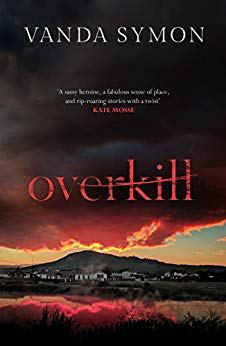
Reviews of books I've read and enjoyed written by other crime fiction authors is something I like to post here from time to time. Like me, I'm certain that many crime fiction fans appreciate the chance to hear about a great book they haven't heard about previously. Overkill, a novel written by New Zealand mystery/thriller author Vanda Symon is one of those books and one I recommend without reservation to those who enjoy a tightly written and well-plotted detective story.
Born in Tauranga, New Zealand, Vanda Symon is a crime writer and radio host from Dunedin, New Zealand, and the Chair of the Otago Southland Branch of the New Zealand Society of Authors. Symon is a full-time writer and mother, and I was impressed to learn that her first novel Overkill, was written while juggling the demands of a 6-month-old baby and a two-year-old. As someone who requires almost total quiet to write, that's something I know I'd never been able to do.
While Overhill was first published in March 2007 in New Zealand by Penguin Books, a re-edited and updated edition of this first Sam Shephard series novel was made available as an eBook in June 2018. I stumbled across the book while reading an article published in Stuff.co.nz, a New Zealand news website that I follow. I checked out the book on Amazon. After reading the sample there, I decided to buy a copy and read it. I'm so glad I did
because not only did I find Overkill impossible to put down, Vanda Symon has since written and published four more books that I definitely plan to read.
The only downside is that at present only Overkill is available on Amazon or otherwise easily available to U.S. readers. I've learned that the second book in the Sam Shephard series, Ringmaster, will be available in April 2019. Hopefully, the rest of the books will soon follow as I believe Symon would find a large U.S. audience. I liked Overkill enough I've already ordered the paperback version of Ringmaster from the UK and am perfectly happy to paying the shipping to get it. When it comes to getting a good book in my hands, waiting until April for the eBook to be released was simply beyond the limits of my patience. Symon is really that good. Here the five-star review of Overkill I published on Amazon and Goodreads.
A white-knuckle ride with a likable, gutsy female protagonist
Written by New Zealand author Vanda Symon — Sam Shephard, a sole-charge police constable in Mataura (New Zealand), is called to investigate a tragic suicide when the body of a young mother is found washed up on the banks of the Mataura River. The case is complicated by the fact that the victim, Gabriella Knowes is the wife of Shephard's former lover Lockie Knowes. Things become even more complicated when evidence is uncovered that indicates Gabriella Knowes wasn't a suicide at all, but a murder victim.
After notifying her superiors that she has a murder case on her hands, Shephard attempts to cast aside her personal feelings and does her best to uncover evidence aimed at identifying Gabriella's killer. But, once the regional criminal investigators roll into the small rural community to take over the investigation, Sam finds herself on the suspect list and is suspended from duty when her past relationship with the victim's husband comes to light.
But Shephard is the kind of copper who only ever gives 100 percent to her cases. In spite of warnings from her superiors to stay away from the case, she undertakes her own off the books investigation of the murder. She’s just a little too independent-minded to leave her fate in the hands of others once the finger of guilt has been pointed at her. She must find the murderer, and clear her name. Shephard also feels an obligation to both Gabriella and Lockie to find Gabriella's killer.
Shephard is an engaging character. Far from a simplistic archetype, the author gives a great deal of insight into her psyche. The reader discovers that Shephard is still in love with the victim's husband which from the beginning is something she is forced to struggle with while she investigates the case. We see both strength and vulnerability in the character which serves to make her all the more realistic.
Symon is a fetching storyteller, and plotting is clearly one of her strengths. She presents a plausible story with all the extra details that make it stand out. Overkill is all about a young female police constable accused of a crime she didn't commit engaged in a battle of wits to clear her name and bring the perpetrator to justice as the noose tightens. With all the buildup to the denouement, Symon doesn't fail us and brings the story to a thrilling and dramatic finish. If you want to spend a few entertaining hours on a white-knuckle ride with a likable, gutsy female protagonist, then you won’t go far wrong with Overkill. It's clearly one of the best mystery/detective thrillers I've read this year, and I'll definitely be reading more from Vanda Symon.
_______________
Learn more about Vanda Symon by visiting her website http://vandasymon.com/index.php
September 26, 2018
The Malone Report Fall 2018

FALL UPDATES
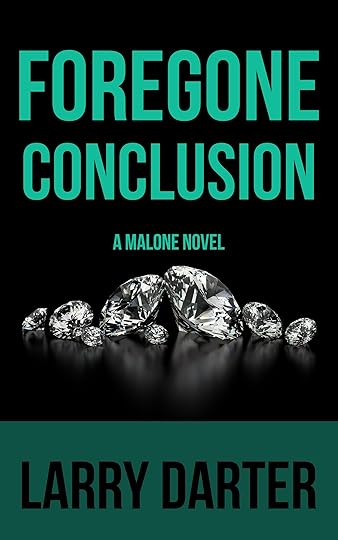
FALL RELEASES
Foregone Conclusion, the fourth novel in the Malone series, was released in September 2018. T.J. O'Sullivan, who first appeared in Cold Comfort, makes an appearance in the novel when Malone must track a diamond thief from Los Angeles to O'Sullivan's home country New Zealand.
The New Zealand setting is in the rugged mountainous terrain around picturesque Queenstown on South Island. T.J. and Malone are forced to negotiate the infamous Skippers Canyon Road, regarded as one of the most dangerous roads in the entire world. My dear friend Jessica who lives in Queenstown gets credit for the idea of using Skippers Canyon in the book, and she provided me some great research.
Foregone Conclusion is available in hardcover, trade paperback, and as an electronic book. Find the eBook at your favorite retailer by clicking on this universal book link.
Speaking of T.J., Honolulu Blues the second book in the T.J. O'Sullivan Thrillers series, featuring the feisty Kiwi ex-pat and Honolulu private eye has also been published this fall. The hardcover and trade paperback versions are now on sale. The electronic book will be released on October 9, but is available for preorder now at a special discounted price. Preorder before October 10 and save a couple of bucks of the $3.99 cover price.
I'm really excited about this book because it is the first book I've worked on with my new editor Sarah Milstead. Sarah is amazing and incredibly experienced in all phases of editing. I think readers will find this the best T.J. novel so far.
After giving it much, I've decided to put the T.J. O'Sullivan Thrillers in KDP Select. This was not an easy decision. If you know much about me then you know I'm not a fan of either KDP Select or the companion Kindle Unlimited program. But, the vast majority of independent authors and publishers continue to flock to KDP Select.
As much as I prefer publishing wide, it is simply getting very difficult to gain any real visibility on Amazon with more than 10 million Kindle titles now available if you don't hold your nose and enroll in their exclusive program. I'm not certain if this will be a permanent decision, but expect the Honolulu Blues eBook to be available only on Amazon for the foreseeable future. I will reevaluate the decision quarterly when it comes time to renew the KDP Select enrollment.
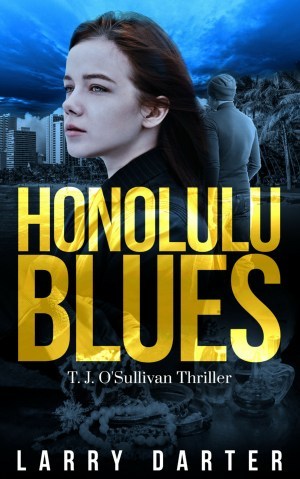
IN THE PIPELINE
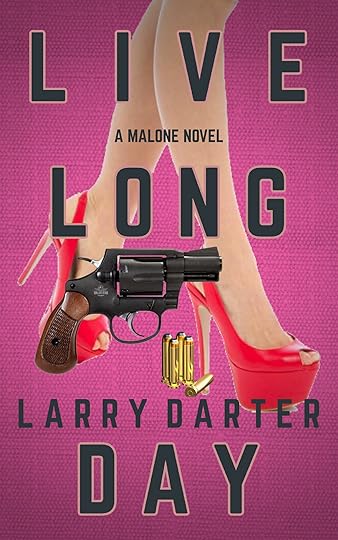
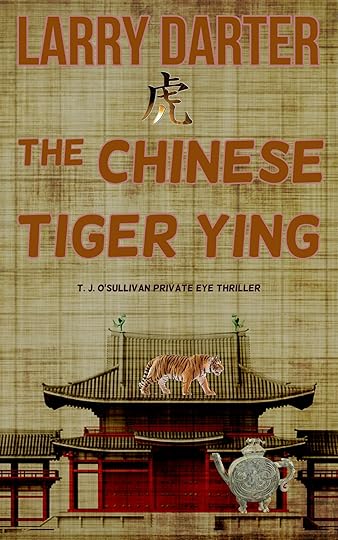
Live Long Day, the fifth book in the Malone series and The Chinese Tiger Ying, the third book in the T. J. O'Sullivan series, are both in development. The first draft of Live Long Day has already been completed, and I'm about fifty-percent through the first draft of The Chinese Tiger Ying.
Live Long Day will be released in December, in time for Christmas. The Chinese Tiger Ying is slated for release in March. I actually think Live Long Day is the best Malone book thus far. And, feel the third T.J. novel is shaping up to be a good one too.
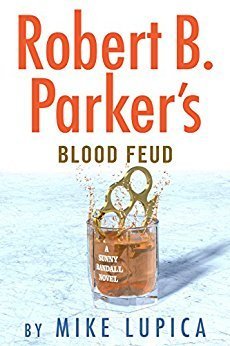
What I'm Reading
Like most authors, I'm also an avid reader. One of the books I read this month was Robert B. Parker's Blood Feud by Mike Lupica. Lupica has been selected by the Robert B. Parker estate to continue Parker's third series starring female private investigator Sunny Randall. If you're a Parker fan like me, or are just looking for something good to read, here is my review of Blood Feud.
Sunny is back... Blood Feud a solid resurrection of the Sunny Randall series
Sunny is back. As a longtime devoted fan of Robert B. Parker, the dean of American crime fiction, I was devastated when he passed away in 2010. I felt mixed emotions when the estate decided to continue Robert B. Parker's characters and series by turning them over to other authors. While I mourned the loss of Spenser especially, I found myself in agreement with John D. MacDonald's son Maynard when he explained why he refused offers to continue his father's popular and influential Travis McGee series. “It is because I have never seen a really good imitation, be it art, literature, or music, that carries that poignant echo of the original artist.”
Parker not only revived the private detective novel, but he also revolutionized it by bringing to the genre a literary-like quality that made it respectable. It's quite difficult to imagine another author ever filling those big shoes by giving us fanatical Parker fans a novel that reads anywhere close to those penned by Spenser’s late creator.
Yet, I've been pleasantly surprised to see how well Ace Atkins and Reed Farrel Coleman have done with the Spenser novels and Jesse Stone series respectively. Neither author is Robert B. Parker, but both are excellent writers and do a credible job with the series each has continued. It was for that reason I was keen to see how Mike Lupica would do with the Sunny Randall series when I learned the estate had tapped him to continue it.
I was counting the days until the release of Blood Feud when I had the good fortune of being offered a complimentary ARC to review by the publisher which I happily accepted. Like Atkins and Farrel, Mike Lucia is not Robert B. Parker, but I thoroughly enjoyed reading his first Sunny Randall novel. Sunny along with all the other principal supporting characters seemed the same as I'd remembered them. Also, the case that provided the basis for the story was one which I could easily imagine Sunny pursuing.
Lupica didn't disappoint. For the most part, his writing is tight and exciting, and he kept me turning the pages. I'll be looking forward to his next Sunny Randall novel as Blood Feud was a worthwhile and entertaining read.
_______________
Blood Feud is slated for release November 27, and available for preorder on Amazon. I'm a little surprised surprised that the publisher has set the eBook cover price at $13.99. While I thought it was a good read, I wouldn't have paid $13.99 for it. The Sunny Randall series was never as popular as Parker's other two series, Spenser and Jesse Stone. I really expect the publisher will drop the eBook cover price when they see the sales figures at launch, so I wouldn't recommend preordering the book. I did have every intention of buying this book. But, frankly, if I'd not been offered an advance review copy by the publisher, I'd have waited until used copies of the print edition became available and picked it up for far less than $13.99. I'm just not going to pay that kind of money for an eBook when there are so many quality reads out there for a fraction of that price.
While I found Lupica to be a fine and entertaining writer, he isn't in the class of John Standford who is absolutely the ONLY author on the planet whose eBooks I'd ever consider paying $13.99 for.
That wraps up the newsletter for Fall 2018. As always, thanks so much for your support.
September 12, 2018
What is the Tiger Ying?


In The Chinese Tiger Ying, the third novel in the T. J. O'Sullivan Private Eye Thriller series, the Tiger Ying plays a pivotal role both in the solution of a crime and the unraveling of secrets.
Unlike the fictional jewel-encrusted falcon is Dashiell Hammet's classic third novel, The Maltese Falcon (1930), which set the standard by which all subsequent detective fiction would be judged, Tiger Ying is a real-life Chinese cultural relic. It is a rare bronze water vessel, which dates back to the Western Zhou dynasty (1027-771BC). The vessel is called the Tiger Ying because the spout and lid are both cast with models of tigers.
Chinese art Consultant, Alastair Gibson, discovered the artifact when he was asked to view a small collection of Chinese bronzes in a house in Kent, a city in the south of England. Gibson said that there is nothing else comparable to the Tiger Ying in today’s market. “Only one Ying has ever been offered at auction before, and none
of the five others known is modeled with what in Chinese art is considered the king among beasts and the most powerful animal for warding off evil.”
The Bronze relic was looted from China in 1860 by Royal Marine captain Harry Lewis Evans when British and French troops under the orders of Lord Elgin, the British ambassador to China, sacked and destroyed the Old Summer Palace (Yuanmingyuan), northwest of Beijing, during the Second Opium War in 1856-60. In a letter to his mother, Evans wrote, "From the palace on the plain I succeeded in getting several bronzes and enamel vases that will, I hope, someday find their way to [his home in the UK], as well as some very fine porcelain cups and saucers of the Emperors’ imperial pattern." Historians are satisfied that the Tiger Ying was one of the bronze artifacts mentioned in the letter.
In April 2018, the Tiger Ying was sold at auction to an unnamed collector for 410,000 GBP ($582,000). According to the auctioneers at Canterbury Auction Galleries in Kent, only six similar archaic vessels, known as ting, are said to exist, and five of them are in museums.
The auction of Tiger Ying proceeded over the objections of Chinese government officials who are taking steps to attempt repatriation of stolen Chinese cultural artifacts. The Chinese Cultural Relics Society estimates that China has lost more than 10 million antiques since 1840 through wartime looting and illegal excavations.
When I happened across a news story about the auction of the Tiger Ying, my thoughts turned immediately to The Maltese Falcon and the seed of the idea for T. J. O'Sullivan's third adventure was planted.
While making no claim that The Chinese Tiger Ying will come anywhere close to the popularity of the enduring classic penned by Hammet, midway through the first draft I think T. J. O'Sullivan fans will find the book an entertaining read.
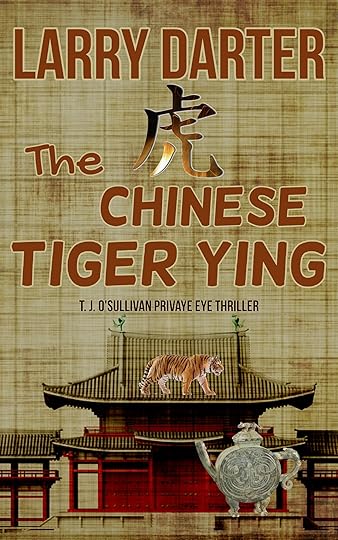
READ THE SYNOPSIS



